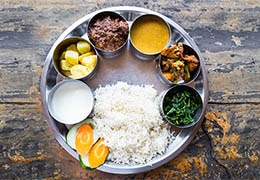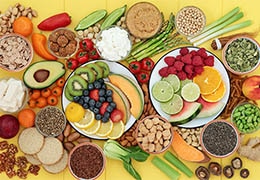A healthy, protein-rich diet can lay the right nutritional foundation for your child and save them from a lot of health issues later in life. Proteins are the building blocks of bones, muscles, cartilage, skin, and blood and we also need protein to build and repair tissues in our body. Growing children need protein to meet their developmental milestones, 2 daily servings is the recommended amount for children in the age group of 2-12 years.
While animal foods like milk, meat, fish and eggs are great sources of high quality protein, plant foods such as pulses and legumes are good sources too, though not of the same quality because of their low content of some of the essential amino acids. However, a combination of cereals, millets and pulses complement each other to provide most of the amino acids that the body needs.
To ensure your child grows up with the right amount of protein in their diet, it is a good idea to transition them from vegetarian sources to non-vegetarian sources gradually. It is wise to start with eggs and poultry items and then gradually progress to meat, followed by fish, and other seafood. Here’s a list of protein-rich foods that your child will benefit from:
- Fish: Known as the most popular food which supports brain development, fish is high in protein and omega-3 fatty acids. The oily and cold-water varieties are amazing sources of special fats called eicosapentaenoic acid (EPA) and docosahexaenoic acid (DHA), These brain-boosting components are produced by marine algae, which the fishes feed on.
- Eggs: The white of the egg contains protein of the highest biological value, which means that all of the protein consumed is completely absorbed and utilised by the body. Additionally, the yolk is a rich source of choline, along with fat and vitamin A. Choline is known to enhance memory power. Do ensure that the child does not have an egg allergy, as eggs are among the top ten most common food allergens.
- Nuts: In addition to proteins, nuts are packed with essential fats, some B vitamins, as well as vitamin E. While vitamin B helps in the utilisation of glucose by the brain and nerves, vitamin E is an antioxidant that guards the neural membranes. Nuts must be introduced when your child is around 12-15 months of age. However, watch out for any allergic reaction, especially to peanuts. Being a good source of vitamin E, nuts promise enhanced cognitive performance (thinking, learning, memory, scholastic performance, and so on) for your child!
- Millets: These are staples that you can introduce as complementary foods early on. Millets have a low glycaemic index, yet contain minerals like potassium and zinc, and certain B vitamins in abundance. These nutrients create a favourable combination for optimal brain development. When it comes to cereals, just remember to go for whole grains, and you will be set for a healthy start.
- Dairy products: Milk or milk products are undoubtedly a treasure-trove of protein and calcium. But, don’t opt for the high-fat sources, low-fat/skimmed milk, cottage cheese, and curd are powerhouses of proteins, good fats, and certain B-vitamins.
It can take a bit of trial and error to include healthy foods in your child’s diet. At the same time, it goes without saying that a balanced diet for children with adequate protein must be the ultimate focus, unless your child has an allergy and the doctor or dietician suggests otherwise.












